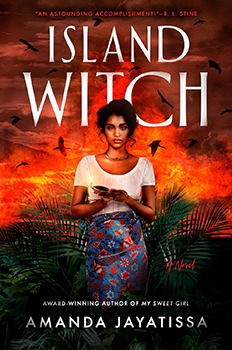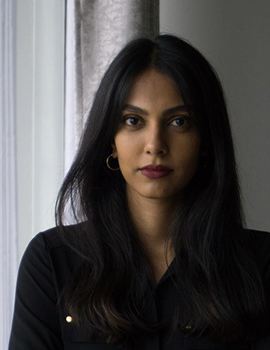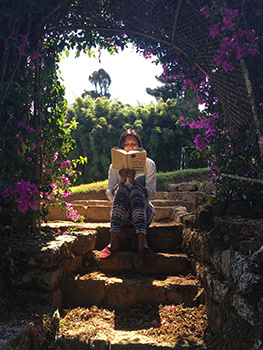FICTION, FOLKLORE & FEMINISM
The Big Thrill Interviews Author Amanda Jayatissa
 Sometimes, moving forward means looking back.
Sometimes, moving forward means looking back.
Sri Lanka native Amanda Jayatissa demanded the crime fiction community’s attention with her culturally infused debut, My Sweet Girl, which won ITW’s Best First Novel Award in 2022. Her follow-up, You’re Invited, earned a recommendation from Brad Thor on The Today Show and was named a Book of the Month selection. Then, in a real-life plot twist, Jayatissa found herself taking a calculated risk by eschewing current day to revisit the local lore of her childhood—and an abandoned outline—for February’s ISLAND WITCH.
A historical work with elements of physical and psychological horror, ISLAND WITCH draws on the country’s infamous specter, Mohini—who the author describes as the “quintessential Woman in White.” Jayatissa reimagines this enigmatic ghost’s origin story through Amara Akki, the teenage daughter of a traditional demon priest, whose family is vilified after a series of brutal and mysterious attacks against male villagers inspires widespread fear and paranoia. Maligned by her community and marginalized by her gender, Amara embraces her inner rage as she seeks redemption.
Here, Jayatissa shares the empowering story of how writing ISLAND WITCH allowed her to reframe one of history’s enduring stereotypes: women as villains rather than victors.

ISLAND WITCH is a departure from your earlier novels. Tell us what compelled you to take this risk and find the courage to do so despite your initial reservations.
I had the idea for ISLAND WITCH many years ago—a rage-filled coming-of-age tale of a young girl from a Sri Lankan village—and even wrote a full outline at the time. But something held me back from committing to this idea fully. Perhaps a part of me knew I wasn’t ready at the time. I found this outline many years later, around the time I was having a conversation with my editor about what I would write next. We were chatting about an entirely different book—one that I’d even written a few chapters for—when I jokingly mentioned ISLAND WITCH at the very end of our conversation.I could tell from her smile when she said, “tell me more,” that there was something there worth exploring. I offered to send her a few chapters, and we could take it from there. I was so nervous. ISLAND WITCH truly is so different from my previous two books, and I wasn’t sure if anyone would like it. Thankfully, my editor and the team at Berkley did, so here we are.

As a native of Sri Lanka, you grew up (over)hearing the kind of folklore that serve as an underpinning to this book. What impression did those stories make on you as a child, and how has your understanding of them changed when considered through adult eyes?
ISLAND WITCH is how I visualized the origin story for Sri Lanka’s most famous ghost—Mohini. Our own quintessential Woman in White, Mohini was a story I enjoyed telling as a child. I even dressed up like her once to scare my cousins. But while the scary stories whispered around a candle were fun, as I got older, I started wondering how Mohini came to be. All we knew about her was that she wore white and carried a baby and attacked men, but surely there had to be more to her story than that? What led to her turning out the way she did?
The more I thought about it, the more it upset me—how often were we willing to accept that women were “villains” just because history or lore told us so? How often did we get to hear their side of the story? It was one of the main reasons that sparked the idea for this story. Too many people were comfortable labeling Mohini a demon and moving on, but I wanted to know more. And when I couldn’t find out more, I decided to give her story a voice.
The story is set in the 19th century yet has all the immediacy and urgency of the contemporary world. How did you endeavor to balance an authentic sense of people, place, and language with more modern sensibilities? And what role did creative license play in that?

This was my first historical novel set in my home country, so I felt a very strong sense of duty to tell this story with as much historic and cultural accuracy as possible. Right off the bat, I hit a roadblock. Most accounts of 19th century Ceylon came from British colonizers. The few that were told by locals were from upper-class Sinhalese, and there were no accounts I could find from a woman’s perspective.
So, I combed through all the texts I could find that spoke of women—their daily lives, their traditions—and then had to take creative liberties in narrating it through Amara, my main character’s, voice.
The language and social interactions came a little easier to me, having grown up in Sri Lanka and speaking Sinhalese as my first language. I’ve visited Matara, where the story is set, many times and spent a lot more time there when I was writing ISLAND WITCH. I think this gave me a lot of confidence to tell the story with the nuance that it deserved.
At its core, ISLAND WITCH is a story about getting caught in the cross-current of change and how women are treated. I think this story works because even now, so many years later, so little of society’s treatment of women has changed.
Amara is subject to many of the same prejudices and stereotypes that still serve to undermine women and other marginalized groups (gender, religion, sexuality, etc.). In what ways is her story illustrative of the dangers that can, and often do, result from such biases—both in terms of reception and response?
When I was researching ISLAND WITCH, a bulk of my insight into the demonic practices came from a book written in 1860. Interestingly, most of those practices remain unchanged, even to this day.
Much of the ways that women are treated, in Sri Lanka and all over the world, remains unchanged, as well. Some social structures have changed, yes, but the underlying bias continues to exist.
Sri Lanka’s colonizers have come and gone, but much of their ideology still persists.
And like all vilified groups, it’s only a matter of time until there is some sort of pushback. Just like Amara, shoved to the edge of desperation, had no choice but to fight back, we’ve seen women and other marginalized groups try to fight for themselves. And sadly, just like Amara, we see them framed as villains.
You implement both visceral horror and psychological torment throughout the narrative. How do these elements work in tandem to enhance the story’s potency, and in what ways do you think the totality of such trauma underscores the book’s themes (and the overall reading experience)?
I knew when I started writing ISLAND WITCH that I wanted it to be a slow-burn, gothic horror, so I set about the task of delicately trying to balance the horror elements with the psychological ones. On a personal level, while I do love a good horror story, I’ve found that it’s the psychological torment that truly leaves me ill at ease and fearful. While the demons (yakku) and curses (hooniyam) in ISLAND WITCH are creepy, what I feel was truly horrific was the torment Amara faced at the hands of people—those she knew and trusted. I hope it leaves the reader questioning what is scarier to them.
While much of a writer’s work is solitary, bringing a novel to fruition is also a communal experience. Tell us about this collaborative process and how it helped you share and sharpen your vision for this book.
There are some books that just pour out of you—words forming sentences on the page with confidence and ease. ISLAND WITCH was not one of those books. Writing it felt like wrestling the story out of me. It’s been through multiple, significant edits from its outline to now and would never have seen the light of day without a communal effort.
The first person to help with the process was my amazing agent, Melissa Danaczko, who didn’t just read and give me great feedback but had to reassure me every step of the way. My editor, Jen Monroe, always gives me the best suggestions, which led to a significant edit that I’m so glad happened. And importantly, my friend Thilani Samarasinghe, a history expert who lent me books, sent me information, and read the manuscript for inaccuracies.
Then, there were the numerous people in Matara, where the story takes place, who kindly answered my questions and chatted with me—from the priest at the Devinuwara Temple to the priest at a small chapel on the Dutch fort, the historian at the Star Fort, and the ladies at the Nupe Market, among many others.
In addition to being a novelist, you are a corporate trainer, business owner, and dog mom. What is your approach to achieving some semblance of balance between these roles, and how have you found that other facets of your life influence your craft?
As a writer (and an avid reader), I think my first, most comfortable response is always to lock myself in a room and write, preferably not seeing a single soul apart from my husband and dogs. Sadly, I have found that this makes me a worse writer, not a better one. Writing stems from being curious—about life, about people, why things are the way they are, and why we accept them that way. And the more curious I’ve gotten, the more I’ve stepped out of my writing room and explored, the more interesting my writing has become.
We recently moved from Sri Lanka to Portugal, and it’s definitely been a good shake-up to our previously comfortable routine. There’s nothing like exploring a new city to really get those creative juices flowing.
Leave us with a teaser: What comes next?
I can’t officially comment on anything yet, but I will say—more dead bodies, a plot twist or two, and at its center, a woman clawing her way to the truth.
The Big Thrill Interviews Author Amanda Jayatissa
- Trial by Ambush - December 16, 2024
- Africa Scene:
Iris Mwanza
by Michael Sears - December 16, 2024 - Elle Marr - August 1, 2024
